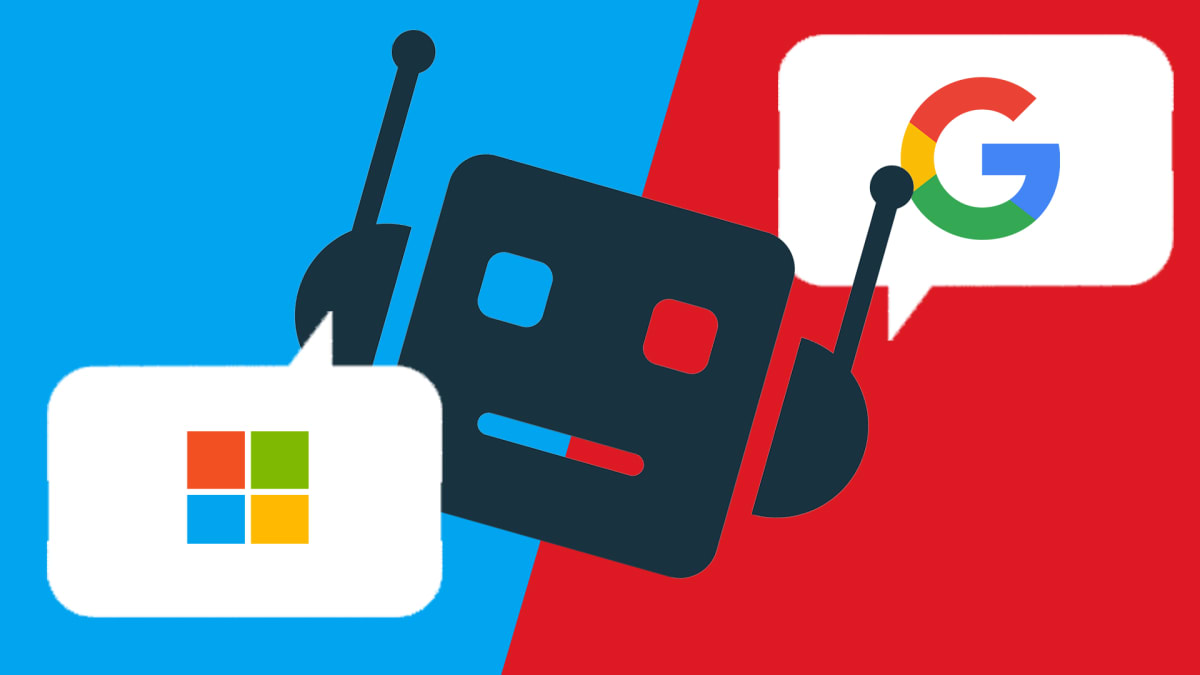
The long-awaited battle can finally begin: Alphabet's Google against Microsoft.
A duel between two tech giants. And the prize is domination of the potentially lucrative artificial-intelligence sector.
Microsoft had taken a lead with the success of ChatGPT, a conversational chatbot launched on Nov. 30 by the startup OpenAI. Software giant Microsoft is the main investor in OpenAI, having already injected more than $10 billion.
ChatGPT is different from previous bots in that it is designed to quickly provide exact answers to complex questions instead of a list of potential links. It can provide human-like responses to queries.
Unlike with other recent technologies announced as revolutionary, consumers have been able to test ChatGPT in their daily lives. And many companies, impressed by the tech, promise to integrate its various features in their products and services.
Microsoft's Big AI Push
Microsoft (MSFT) immediately incorporated ChatGPT features into its Bing search engine, hoping to reshuffle the cards in the search-engine game with Google.
And Microsoft is continuing its AI push. Last week, the Redmond, Wash., group said the technology -- the large language model -- that powers ChatGPT will be added to its Microsoft 365 work software. This new Microsoft 365 is called Copilot and will be integrated into Word, Excel, PowerPoint, and Outlook.
CoPilot can summarize the key discussion points of a conversation held on the Teams meeting software and provide recaps for someone who joins late or misses the whole event. It can create PowerPoint presentations, including images, and can draft emails and analyze long email threads and documents.
In addition, Copilot can create summaries and graphs of data on Excel spreadsheets.
Microsoft said that you can tell Copilot this, for example: 'Tell my team how we updated the product strategy," and it will generate a status update based on the morning’s meetings, emails and chat threads.
"Today marks the next major step in the evolution of how we interact with computing, which will fundamentally change the way we work and unlock a new wave of productivity growth,” Microsoft Chairman and CEO Satya Nadella said in a statement.
Google's Response: the Launch of Bard
While Microsoft has warned that Copilot, like Bing-ChatGPT, could make mistakes, the company's initiatives nevertheless threaten, Google, its key rival both in search engines and in the cloud business.
Google (GOOGL) therefore had to react -- and it has, officially launching Bard as a rival to ChatGPT.
Bard now has some U.S. and U.K. users who registered on a waitlist, the company said in a blog post. There, the Mountain View, Calif., search, advertising and cloud stalwart lists different tasks the chatbot can perform.
Bard can draft a packing list for your weekend fishing and camping trip, Google says. It can outline your blog post about summer mocktail recipes, explain why large language models might make mistakes, and suggest more high-protein options to add to your vegan diet.
The chatbot can also explain why lightning might strike the same place twice, can help you get started on writing your first novel and finish your art studio tagline.
Google introduced Bard as "your creative and helpful collaborator, here to supercharge your imagination, boost your productivity, and bring your ideas to life."
The company also warned, however, that Bard can make mistakes, aiming to address potential criticism.
"Bard is an experiment and may give inaccurate or inappropriate responses. You can help make Bard better by leaving feedback. Join the waitlist and try it for yourself," Google said.
Censorship Questions About Both AI Engines
Neither Google nor Microsoft will be able to escape the censorship charges leveled against them by conservative circles. These critics say, for example, that ChatGPT refuses to provide answers on questions relating to culture-war issues like climate change, gender equality, racism, antisemitism and more.
As a result, they conclude that the developers of AI applications want to advance a progressive agenda.
Bloomberg News reporters who tested Bard report that the program refuses to answer a question about how to make a bomb.
"I will not create content of that nature, I suggest you don't either," Bard responded.
The chatbot also provided nonsensical responses to queries related to Mars.
In February, Google, panicked by the success of ChatGPT, launched Bard but had to stop after the chatbot delivered inaccurate information to a question focused on telescopes.
"What new discoveries from the James Webb Space Telescope can I tell my 9 year old about," Bard was asked.
"JWST took the very first pictures of a planet outside our solar system," the chatbot powered by AI responded.
This response suggests the telescope was used to take the first exoplanet photos -- i.e., pictures of plants beyond the Earth's solar system -- in history.
That distinction, however, belongs to the European Southern Observatory’s Very Large Telescope, which recorded the first exoplanet photos in 2004.
Action Alerts PLUS offers expert portfolio guidance to help you make informed investing decisions. Sign up now.







